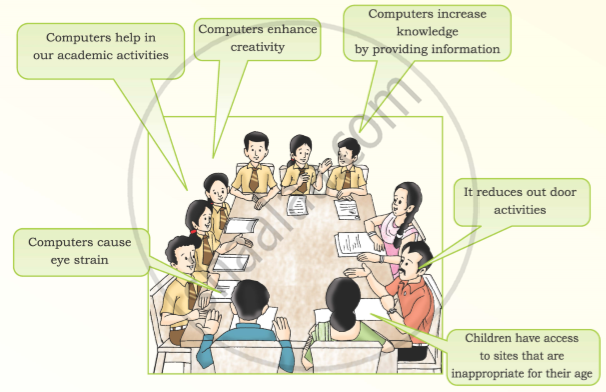Advertisements
Advertisements
प्रश्न
What does the author notice one Sunday afternoon? What is his mother’s reaction? What does she do?
उत्तर
One Sunday afternoon, the author noticed a strange smell. Then he saw smoke pouring in through the seams of the ceiling and filling the room very quickly. They could barely see anything. By the time they ran out into the front yard, the roof was already engulfed in flames and was spreading very quickly. His mother ran back into the house. She had brought out a small metal box full of important documents. She wanted to bring out important things from the house one by one. She was in a ‘crazed state’.
APPEARS IN
संबंधित प्रश्न
Answer following question in short.
How did kangaroos react to duck’s request?
Thinking about Poem
What finally kills the tree?
What is Behrman’s masterpiece? What makes Sue say so?
Sergei says, “I am happy that my words have taken effect.” Why does he say so? Is he right in saying this?
During their conversation Lushkoff reveals that Sergei’s cook, Olga, is responsible for the positive change in him. How has Olga saved Lushkoff?
After having read the story, you realise the anguish of the illiterate adults. You want to make your friends aware of it and contribute something in bringing about a change in the lives of the illiterate adults. Deliver a speech in the morning assembly at your school about the Importance of Adult Education and ways to implement it.
Read the following to make your speech effective:
The introduction of a speech is like the nose of an airplane. The nose sets the course and leads the plane off in a specific direction. A good introduction sets the direction of your speech by
- getting the attention of your audience
- introducing your topic
- stating your central idea or purpose
- briefly identifying the main points
- making your audience eager to hear what you have to say
Both, all, neither, none

Reporting verbs
Did you know?
Sometimes it is not necessary to report everything that is said word for word. It may be better to use “reporting verbs” which summarise what was communicated. Below are some of the most commonly used verbs of this kind.
| accept | advice | apologise | ask | assure | blame |
| complain | compliment | congratulate | explain | greet | hope |
| introduce | invite | offer | order | persuade | promise |
| refuse | regret | remind | say | suggest | tell |
| sympathise | thank | threaten | answer | warn | encourage |
|
can you hear me? (speaker) |
what did she say? (you) | she asked if you could hear her? (friend) (ask) |
| you should go to the doctor now? (speaker) | what did he say? (you) | he advice you to go to the doctor now? (friend) (advice) |
This is a meeting of the school's Parent-Teacher Association. Some student representatives have also been invited to participate to discuss the role that Information Technology I Computers play in the growth and development of children.

There was a time when our people covered the land as the waves of a wind-ruffled sea cover its shell-paved floor, but that time long since passed away with the greatness of tribes that are now but a mournful memory. 1 will not dwell on, nor mourn over, our untimely decay, nor reproach my paleface brothers with hastening it, as we too may have been somewhat to blame.
Youth is impulsive. When our young men grow angry at some real or imaginary wrong, and disfigure their faces with black paint, it denotes that their hearts are black, and that they are often cruel and relentless, and our old men and old women are unable to restrain them. Thus it has ever been. Thus it was when the white man began to push our forefathers ever westward. But let us hope that the hostilities between us may never return. We would have everything to lose and nothing to gain. Revenge by young men is considered gain, even at the cost of their own lives, but old men who stay at home in times of war, and mothers who have sons to lose, know better.
Read the extract given below and answer the question that follow.
What happened when the tribal young man became angry?
After considering the matter, and talking it over with his wife, farmer Jones said that he would take John, and do well by him, now that his mother was out of the way; and Mrs. Ellis, who had been looking out for a bound girl, concluded that it would be charitable in her to make choice of Katy, even though she was too young to be of much use for several years.
“I could do much better, I know,” said Mrs. Ellis; “but as no one seems inclined to take her, I must act from a sense of duty expect to have trouble with the child; for she’s an undisciplined thing—used to having her own way.”
But no one said “I’ll take Maggie.” Pitying glances were cast on her wan and wasted form and thoughts were troubled on her account. Mothers brought cast-off garments and, removing her soiled and ragged clothes, dressed her in clean attire. The sad eyes and patient face of the little one touched many hearts, and even knocked at them for entrance. But none opened to take her in. Who wanted a bed-ridden child?
“Take her to the poorhouse,” said a rough man, of whom the question “What’s to be done with Maggie?” was asked. “Nobody’s going to be bothered with her.”
“The poorhouse is a sad place for a sick and helpless child,” answered one.
“For your child or mine,” said the other, lightly speaking; “but for tis brat it will prove a blessed change, she will be kept clean, have healthy food, and be doctored, which is more than can be said of her past condition.”
Read the extract given below and answer the question that follow.
What solution did the rough man suggest for Maggie? Why would the poorhouse be a good place for Maggie?
Read the following.
A group of children in your class are going to live in a hostel.
•They have been asked to choose a person in the group to share a room with.
•They are asking each other questions to decide who they would like to share a room with. Ask one another questions about likes/dislikes/preferences/hobbies/personal characteristics.
Use the following questions and sentence openings.
(i) What do you enjoy doing after school?
I enjoy...
(ii) What do you like in general?
I like...
(iii) Do you play any game?
I don’t like...
(iv) Would you mind if I listened to music after dinner?
I wouldn’t...
(v) Will it be all right if I...?
It’s fine with me...
(vi) Is there anything you dislike, particularly? Well, I can’t share...
(vii) Do you like to attend parties?
Oh, I...
(viii) Would you say you are...?
I think...
What do you know about worker ants?
What items of food did Golu take before leaving his home for the Limpopo river?
What was the connection between the motor and the fan’s Chatter?
Answer the question.
Why does the poet wonder if teachers also do things that other people do?
Why is the window dusty?
The words helper, companion, partner and accomplice have very similar meanings, but each word is typically used in certain phrases. Can you fill in the blanks below with the most commonly used words? A dictionary may help you.
my ……………. on the journey.
With close reference to Act V, examine how Shakespeare presents the idea of forgiveness and reconciliation at the end of the play.
Which of the following words does H. W. Longfellow use to describe the movement of the phantoms in his poem, ‘Haunted Houses’?
